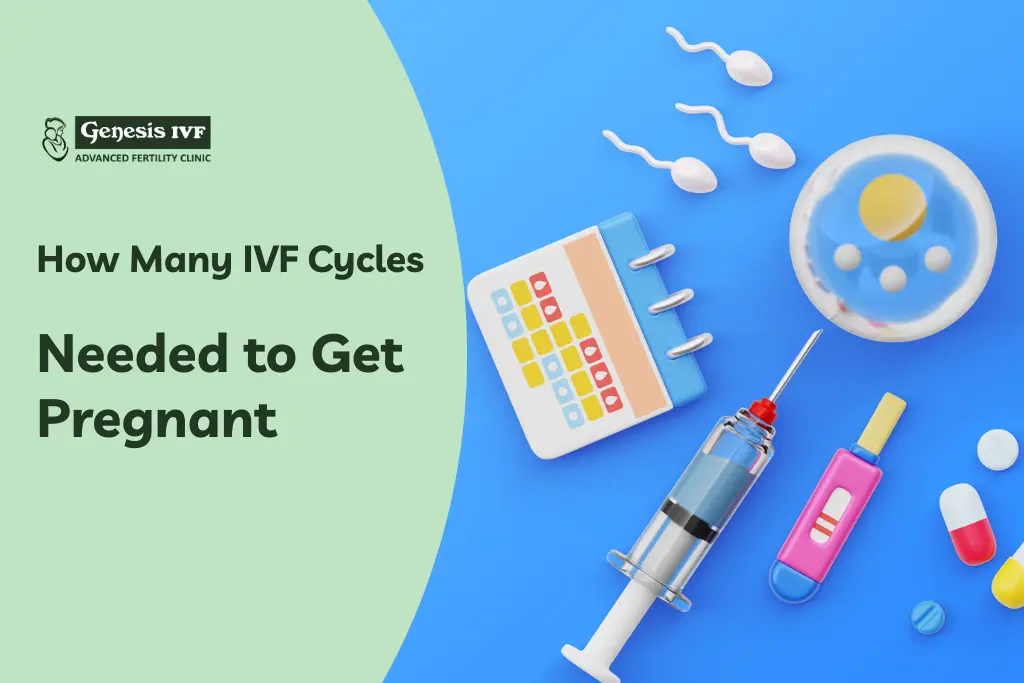In vitro fertilization is a very effective fertility treatment today that brings hope to couples who are having trouble conceiving. But IVF does not always happen the first time. Most patients ask themselves how many cycles they will have to undergo in order to become pregnant. Although it is dependent on a number of medical and personal variables, knowing the process and what affects success rates will allow individuals to have realistic expectations.
At Genesis IVF Fertility Centre, we navigate couples through this process with transparency, science-supported treatment, and customized treatment plans.
IVF can be a journey of hope, but every couple’s path is unique. Understanding the process and success factors helps set realistic expectations.
IVF Success is Not Always in the First Cycle
While a few couples conceive in their initial IVF cycle, most take more than one cycle. IVF success relies on age, why they are infertile, the quality of eggs and sperm, the condition of the uterus, and the actual treatment protocol employed. The initial cycle tends to function as a diagnostic and treatment modality, providing fertility experts with important knowledge regarding how the patient’s body reacts to medications and procedures. This knowledge allows it to fine-tune the strategy in subsequent cycles, frequently yielding better results.
Average Number of IVF Cycles for Pregnancy
Using evidence from multiple international studies of fertility, the number of IVF cycles taken to realize a live birth approximates two to three. It has been found through studies that cumulative success rates enhance considerably over several cycles. As an instance, females younger than thirty five have a forty to fifty percent chance of success in the initial cycle. By the third cycle, this figure can increase to seventy percent or higher.
Factors That Determine IVF Cycle Count
There are a number of important factors that decide the number of IVF cycles that can be undertaken.
Age of the Woman
Female age is the most powerful prognostic factor for IVF success. Females below thirty five years of age respond optimally to ovarian stimulation with higher quality eggs. Egg quality and quantity become worse with increasing age, with more cycles needed for success. Egg donation might be advised in certain situations for older women or women with low ovarian reserve.
Cause of Infertility
Some causes such as blocked fallopian tubes or mild male factor infertility can respond rapidly to IVF. But more challenging cases such as endometriosis, unexplained infertility, or recurrent implantation failure will take more than one cycle and more individualized protocols to become pregnant.
Embryo Quality and Genetic Health
Embryo quality is the biggest determinant of IVF success. Cutting-edge technologies like blastocyst culture, preimplantation genetic testing, and embryo glue can greatly enhance success by transferring only the healthiest embryos. Genesis IVF employs the newest laboratory technology to culture embryos and enhance successful implantation.
Male Factor Fertility
Male infertility is the cause of almost half of all cases of infertility. A low sperm count or lack of motility can be overcome with the help of ICSI or IMSI, which enable direct injection of the healthy sperm into the egg. Such procedures can enhance fertilization success and decrease the required number of cycles.
Lifestyle and Health Considerations
Overall health, weight, diet, stress levels, and lifestyle habits such as smoking or drinking can affect fertility success. We counsel patients at Genesis IVF on how to optimize lifestyle for improved response to treatment and overall reproductive well-being.
How to Enhance Success Within Fewer IVF Cycles
There are several techniques that can enhance the chances of pregnancy in fewer IVF cycles.
Personalized Treatment Plans
We customize each IVF protocol to the individual, depending on the response to hormones, medical history, and test results. This makes it more efficient and less trial-and-error.
Use of Advanced Technology
Laser-assisted hatching, embryo freezing, and time-lapse embryo monitoring techniques enhance implantation opportunities. Genetic testing also identifies chromosomally normal embryos, which lower the risk of miscarriage.
Emotional and Psychological Support
IVF is emotionally taxing. At Genesis IVF, we recognize the value of mental health during fertility. Counseling and support groups may alleviate anxiety and keep patients motivated throughout the process.
When to Consider Other Options
If several IVF attempts fail, patients can explore other possibilities like donor eggs, donor sperm, or surrogacy. Such alternatives tend to work for such situations with poor egg or sperm quality, repeated failure of IVF, or uterine reasons hindering implantation.
Conclusion
IVF success does not usually travel in a direct line. While some individuals become pregnant on the initial try, others might require two, three, or even more attempts. At Genesis IVF Fertility Centre, we are committed to our best results with the minimum emotional and financial distress. Through careful diagnosis, cutting-edge technology, and empathetic care, we guide you towards the dream of parenthood one cycle at a time. Whether you are embarking on your first IVF or on further journey, we assist you at every step with expert advice.




